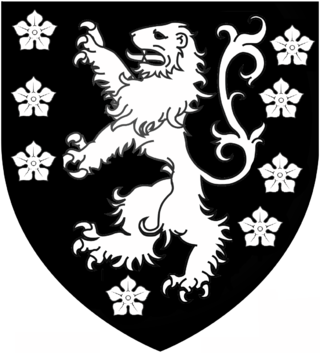
Charles Leslie Falconer, Baron Falconer of Thoroton, is a British Labour politician, peer and barrister who served as Lord Chancellor and Secretary of State for Justice under Prime Minister Tony Blair from 2003 to 2007.
Maud de Chaworth was an English noblewoman and wealthy heiress. She was the only child of Patrick de Chaworth. Sometime before 2 March 1297, she married Henry, 3rd Earl of Lancaster, by whom she had seven children.

Sir Edward Montagu of Boughton, Hanging Houghton and Hemington in Northamptonshire was an English lawyer and judge in the time of Henry VIII and Edward VI. He was Chief Justice of the King's Bench from 1539 to 1545 and Chief Justice of the Common Pleas from 1545 to 1553.

Wellow is a village in Nottinghamshire, England. According to the 2001 census it had a population of 444, increasing to 470 at the 2011 census, but falling slightly to 463 at the 2021 census.
The title Baron Latimer or Latymer has been created, by the definitions of modern peerage law, four times in the Peerage of England. Of these, one was restored from abeyance in 1913; one is forfeit; the other two are dormant, although their heir is well known.

Flintham is a village and civil parish in the Rushcliffe district in Nottinghamshire, 7 miles from Newark-on-Trent and opposite RAF Syerston on the A46. It had a population of 597 at the 2011 census, estimated at 586 in 2019, and a fall to 563 at the 2021 census. The village name was taken by the Ham class minesweeper HMS Flintham.
Sir Richard de Willoughby was an English landowner, politician and judge from Nottinghamshire, who was Chief Justice of the King's Bench for three periods between 1332 and 1340.

Sir John Knyvet was an English lawyer and administrator. He was Chief Justice of the King's Bench from 1365 to 1372, and Lord Chancellor of England from 1372 to 1377.
Richard Willoughby may refer to
Eustace Folville was an English criminal and outlaw who is credited with assassinating the unpopular Sir Roger de Beler, Baron of the Exchequer and henchman of the despised Hugh le Despencer and King Edward II. He was the most active member of the Folville Gang, which engaged in acts of vigilantism and outlawry in Leicestershire in the early 1300s, often on the behalf of others.

Sir Percival Willoughby of Wollaton Hall, Nottinghamshire was a prominent land owner, businessman, and entrepreneur involved during his lifetime variously in mining, iron smelting, and glass making enterprises in Nottinghamshire. He was also an important investor in the Newfoundland Company.
The Justice of Chester was the chief judicial authority for the county palatine of Chester, from the establishment of the county until the abolition of the Great Sessions in Wales and the palatine judicature in 1830.
Sir William Fyncheden KS was a British justice. He was first recorded as a lawyer in 1350, and the same year was made a Commissioner of embankments in Yorkshire. From then on he was a regular appointee to commissions of Oyer and terminer, mostly in Yorkshire but also in Derbyshire, Nottinghamshire and Lincolnshire; he was also appointed as a Justice of Labourers several times in both Yorkshire and Nottinghamshire.
Sir Robert Belknap was a senior English judge.

Sir Gervase Clifton, 1st Baronet, K.B. was an English politician who sat in the House of Commons at various times between 1614 and 1666. He supported the Royalist cause in the English Civil War. He was educated at St John's College, Cambridge.
Sir John Henry Thorold, 12th Baronet was a British Conservative Party politician.

The chief justice of the Common Pleas for Ireland was the presiding judge of the Court of Common Pleas in Ireland, which was known in its early years as the Court of Common Bench, or simply as "the Bench", or "the Dublin bench". It was one of the senior courts of common law in Ireland, and was a mirror of the Court of Common Pleas in England. The Court of Common Pleas was one of the "four courts" which sat in the building in Dublin which is still known as the Four Courts, apart from a period in the fourteenth century when it relocated to Carlow, which was thought, wrongly as it turned out, to be both more central and more secure for the rulers of Norman Ireland.
Colonel Francis Thornhagh or Thornhaugh (1617–1648) was a hero of the Parliamentarian cause in the English Civil War, an MP of East Retford and High Sheriff of Nottinghamshire, who was killed at the Battle of Preston in 1648.

Jordan Foliot was son of Richard Foliot (-1290), Knight of Jordan Castle, and Margery de Stuteville daughter of William de Stuteville and Margaret de Say. Richard had the Rights of Stallage of the Market and Fair on St. Swithuns day valued at 40s yearly in Wellow.

Sir Henry Willoughby was a Knight of the Body to Kings Henry VII and Henry VIII and MGO.